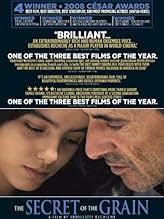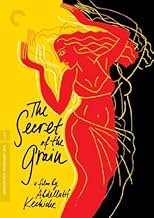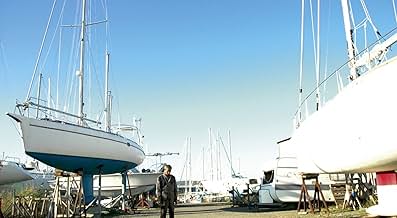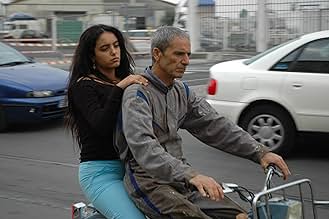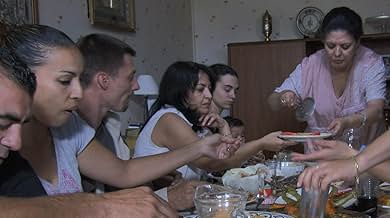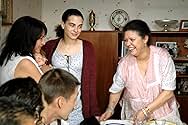IMDb रेटिंग
7.4/10
8.1 हज़ार
आपकी रेटिंग
अपनी भाषा में प्लॉट जोड़ेंIn southern France, a Franco-Arabic shipyard worker along with his partner's daughter pursues his dream of opening a restaurant.In southern France, a Franco-Arabic shipyard worker along with his partner's daughter pursues his dream of opening a restaurant.In southern France, a Franco-Arabic shipyard worker along with his partner's daughter pursues his dream of opening a restaurant.
- निर्देशक
- लेखक
- स्टार
- पुरस्कार
- 19 जीत और कुल 9 नामांकन
Nadia Taoul
- Sarah
- (as Nadia Taouil)
फ़ीचर्ड समीक्षाएं
In his sixties, Slimane (Habib Boufares) is a disillusioned and tired man and, since his divorce from his wife, he has become a kind of free electron within his microcosm reduced to a community from North Africa. After an abrupt dismissal from the shipyard of the port of Sète, he quickly and naturally feels a sense of uselessness until having the unexpected idea and the strong desire to open a couscous restaurant, on a boat destined to scrap. His whole universe (family and friends) will progressively weld around this project which has become for everyone the symbol of a quest for a better life.
The director Abdellatif Kechiche is a perfectionist and creates with La graine et le mulet (2007) a film of atmosphere. It obviously takes time to describe the environment, the characters, the relationships between them, the issues, ... and thus allow the audience to immerse themselves in a universe that is not necessarily his (mine in all case): this is also the magic of cinema. Thus, the pace is deliberately slow, even very slow, with some scenes that may seem disproportionately long or even unnecessary. Nevertheless, from the beginning to the end, I was in total empathy with this Slimane.
As a synthesis: a movie as endearing as moving, as poignant as revitalizing. 7/8 of 10
The director Abdellatif Kechiche is a perfectionist and creates with La graine et le mulet (2007) a film of atmosphere. It obviously takes time to describe the environment, the characters, the relationships between them, the issues, ... and thus allow the audience to immerse themselves in a universe that is not necessarily his (mine in all case): this is also the magic of cinema. Thus, the pace is deliberately slow, even very slow, with some scenes that may seem disproportionately long or even unnecessary. Nevertheless, from the beginning to the end, I was in total empathy with this Slimane.
As a synthesis: a movie as endearing as moving, as poignant as revitalizing. 7/8 of 10
Diane and I attended this wonderful film in Fremantle this morning and both of us left the theater at its conclusion realising that we had seen an unusual film from an unusual ethnic angle and that the director and actors had completed a superb work.
I adore our Australian films because many of them explore the mundane drama of quiet ordinary life and this film is no exception even though it is French rather than Australian. I guess Hollywood does not believe viewers are sensitive enough to pay to see domestic drama and that the subject matter must always be "bigger than Ben Hurr" but our movies as well as many European movies have proved that the examination of quiet aspects of everyday life can provide extremely compelling material for contemporary films.
IMDb commentators found it off-putting to watch long film sequences about potty training, marital squabbles and restaurant scenes; however, this is the stuff of myriad similar domestic situations that we are all familiar with. The genius being that the director can make these scenes rich enough to watch. Diane and I both believe he did this admirably as well as providing much to discuss and reflect upon later.
We both found it different and endearing that we were allowed into the lives of people and their situations that would be closed to us without this delightful film. Yes, I used the adjective "delightful"; the scenes of domesticity were enlightening and compellingly endearing because we are inundated with Western examples of the genre but few (such as in this film) of other ethnic examples.
A film that should not be missed!
I adore our Australian films because many of them explore the mundane drama of quiet ordinary life and this film is no exception even though it is French rather than Australian. I guess Hollywood does not believe viewers are sensitive enough to pay to see domestic drama and that the subject matter must always be "bigger than Ben Hurr" but our movies as well as many European movies have proved that the examination of quiet aspects of everyday life can provide extremely compelling material for contemporary films.
IMDb commentators found it off-putting to watch long film sequences about potty training, marital squabbles and restaurant scenes; however, this is the stuff of myriad similar domestic situations that we are all familiar with. The genius being that the director can make these scenes rich enough to watch. Diane and I both believe he did this admirably as well as providing much to discuss and reflect upon later.
We both found it different and endearing that we were allowed into the lives of people and their situations that would be closed to us without this delightful film. Yes, I used the adjective "delightful"; the scenes of domesticity were enlightening and compellingly endearing because we are inundated with Western examples of the genre but few (such as in this film) of other ethnic examples.
A film that should not be missed!
I have heard this film being compared to Eat Drink Man Woman, which is fair enough, if not slightly deceptive. Sure, there's a similar veneration for the art of cooking and how this draws and binds families. But the film casts a wider net than this may suggest. For me, it strongly resembles the humanistic and naturalistic stories of Robert Guédiguian, particularly La ville est tranquille (The Town is Quiet).
The actors are largely non-professionals. The use of long takes, including long stretches of dialogue, is very impressive and suggests that some of the script may be improvisational. I liked the chit-chat, the small details of daily life (like toilet-training a child), that films normally gloss over.
The film has a documentary look and feel and parts are like a fly-on-the-wall at a family gathering. For me, the importance of this is to convey how human this family is, with a rich and warm cultural heritage. In particular, it renders as impotent, irrational fears of Muslim culture.
The film works on multiple levels because it taps into the universal everyday concerns that potentially touch us all in one form or another: prejudice against immigrants, attitudes towards Islam post 9-11, globalisation, ageism in the workforce, the effects of poverty, family breakdown and more. Yet, importantly, the film is not preachy but merely presents life in a matter-of-fact way.
The female performances in the film are particularly affecting, especially the young Hafsia Herzi playing Rym, the daughter of Slimane's lover, and Leila D'Issernio who plays his Russian daughter-in-law.
At 148 minutes, the film is quite long, though this is not apparent until the final scene, which seems to be prolonged in real-time for a particular effect. On paper, the story looks like something we've seen before, but avoids all the clichés we might expect. I loved it.
The actors are largely non-professionals. The use of long takes, including long stretches of dialogue, is very impressive and suggests that some of the script may be improvisational. I liked the chit-chat, the small details of daily life (like toilet-training a child), that films normally gloss over.
The film has a documentary look and feel and parts are like a fly-on-the-wall at a family gathering. For me, the importance of this is to convey how human this family is, with a rich and warm cultural heritage. In particular, it renders as impotent, irrational fears of Muslim culture.
The film works on multiple levels because it taps into the universal everyday concerns that potentially touch us all in one form or another: prejudice against immigrants, attitudes towards Islam post 9-11, globalisation, ageism in the workforce, the effects of poverty, family breakdown and more. Yet, importantly, the film is not preachy but merely presents life in a matter-of-fact way.
The female performances in the film are particularly affecting, especially the young Hafsia Herzi playing Rym, the daughter of Slimane's lover, and Leila D'Issernio who plays his Russian daughter-in-law.
At 148 minutes, the film is quite long, though this is not apparent until the final scene, which seems to be prolonged in real-time for a particular effect. On paper, the story looks like something we've seen before, but avoids all the clichés we might expect. I loved it.
Something unusual happened at the end of this movie projection. Several people not knowing each other gathered at the cinema exit and discussed the movie. It appeared that the movie was spoiled by several cinematographic tics which the director promoted to the status of the style and used all over the movie "ad nausea". He extends the lengthy sequences probably to make us share the uneasiness of the characters in the given situation (the mother scolding the child for weeing in her panties, the guests waiting for the cous-cous, the final run of Slimane and the belly dance). But this is a 0-level translation of the reality into the cinematographic language. The profusion of the very close-ups and the clip-like filming with very short shots is a minor default. It is probably one of the points which makes some people like the movie as "modern". The movie is almost twice as long as usual and I can not find any cinematographic reason to make it this long, if not just the desire to convince the spectator (and jury) that this movie has something exceptional. We spent some good moments but we hope that this gifted director will not be encouraged to belaborates more in his future creations.
Abdel Kechiche's tragicomedy is a film of contradictions and contrasts. It is both quiet and boisterous, with a script that is both understated and energetic, and which explores (among other things) how communities both accept immigrants, and yet remain suspicious of them.
Couscous follows sixty-something Slimane Beiji, a Tunisian-French shipyard worker in the French port town of Sète, played with reserved dignity by Habib Boufares. Despite being divorced, Slimane still spends a lot of time with his ex-wife and their extended family. The rest of his time is spent with his girlfriend and her daughter, who own a quayside hotel.
When Slimane is laid off, it comes as the last straw in a life that has become increasingly redundant. Left with nothing to lose, he hits upon the idea of opening a restaurant on an old boat. The project becomes a focal point for Slimane's extended family: his sons lend a hand with the boat's renovation; his girlfriend's daughter helps acquiring the necessary bank loans and official documents; and his ex-wife will cook the restaurants signature dish the eponymous couscous.
The restaurant works as a symbol of the hopes and dreams of immigrants how all they want is to integrate and work in their new community, whilst still retaining the culture and customs of their homeland. But it also signifies the duality of a community's attitude toward immigrants. During a party thrown to promote Slimane's restaurant, the guests all compliment their host and try their hand at a little Arabic; and yet, when Slimane's back is turned, they whisper amongst themselves that "he's not from around here." But Couscous really shines in its extended scenes of dialogue. At several points during the film we join Slimane and his family as they sit in kitchens or dining rooms and do nothing but talk. And it is a joy to watch. The script shows an eye for authentic dialogue, meandering through topics as diverse as racism in the workplace, the extortionate price of nappies, and using Arabic in the bedroom. The genuine performances from the supporting cast draw us further into these scenes, and the cinematography keeps us there. The camera squeezes between family members, getting the kind of intimate close-ups that give a real impression of a loud family dinner.
This light-hearted attitude, present in the early scenes, contrasts with a grimmer final third, in which situations get progressively worse. And as things get worse, family relationships start to break down.
This also reveals the film's ultimate irony. Slimane's family is a close-knit unit when the members each live separate lives. But when the restaurant brings them together, family unity dissolves and they resort to serious bickering.
Couscous follows sixty-something Slimane Beiji, a Tunisian-French shipyard worker in the French port town of Sète, played with reserved dignity by Habib Boufares. Despite being divorced, Slimane still spends a lot of time with his ex-wife and their extended family. The rest of his time is spent with his girlfriend and her daughter, who own a quayside hotel.
When Slimane is laid off, it comes as the last straw in a life that has become increasingly redundant. Left with nothing to lose, he hits upon the idea of opening a restaurant on an old boat. The project becomes a focal point for Slimane's extended family: his sons lend a hand with the boat's renovation; his girlfriend's daughter helps acquiring the necessary bank loans and official documents; and his ex-wife will cook the restaurants signature dish the eponymous couscous.
The restaurant works as a symbol of the hopes and dreams of immigrants how all they want is to integrate and work in their new community, whilst still retaining the culture and customs of their homeland. But it also signifies the duality of a community's attitude toward immigrants. During a party thrown to promote Slimane's restaurant, the guests all compliment their host and try their hand at a little Arabic; and yet, when Slimane's back is turned, they whisper amongst themselves that "he's not from around here." But Couscous really shines in its extended scenes of dialogue. At several points during the film we join Slimane and his family as they sit in kitchens or dining rooms and do nothing but talk. And it is a joy to watch. The script shows an eye for authentic dialogue, meandering through topics as diverse as racism in the workplace, the extortionate price of nappies, and using Arabic in the bedroom. The genuine performances from the supporting cast draw us further into these scenes, and the cinematography keeps us there. The camera squeezes between family members, getting the kind of intimate close-ups that give a real impression of a loud family dinner.
This light-hearted attitude, present in the early scenes, contrasts with a grimmer final third, in which situations get progressively worse. And as things get worse, family relationships start to break down.
This also reveals the film's ultimate irony. Slimane's family is a close-knit unit when the members each live separate lives. But when the restaurant brings them together, family unity dissolves and they resort to serious bickering.
क्या आपको पता है
- ट्रिवियाShooting was supposed to start in the summer of 2005 but one of the leading actors was sick, which resulted in a major delay. Thus, filming actually started on 5 September 2005 and was still running by 16 January 2006. The set was on a boat in the port of Sète for at least six weeks from October to December 2006. Outside temperatures were very low, as opposed to what they should have been if schedule could have been held. This led the production to set up large tents near the boat with heating systems for the actors and extras to remain comfortable between takes.
- कनेक्शनFeatured in Maltin on Movies: Flipped (2010)
- साउंडट्रैकEl fan hob wa imane
Written by Mohamed Abdel Wahab and Hussein El Sayed
टॉप पसंद
रेटिंग देने के लिए साइन-इन करें और वैयक्तिकृत सुझावों के लिए वॉचलिस्ट करें
- How long is The Secret of the Grain?Alexa द्वारा संचालित
विवरण
बॉक्स ऑफ़िस
- US और कनाडा में सकल
- $86,356
- US और कनाडा में पहले सप्ताह में कुल कमाई
- $9,850
- 28 दिस॰ 2008
- दुनिया भर में सकल
- $1,47,76,783
- चलने की अवधि
- 2 घं 31 मि(151 min)
- रंग
- ध्वनि मिश्रण
- पक्ष अनुपात
- 1.85 : 1
इस पेज में योगदान दें
किसी बदलाव का सुझाव दें या अनुपलब्ध कॉन्टेंट जोड़ें

